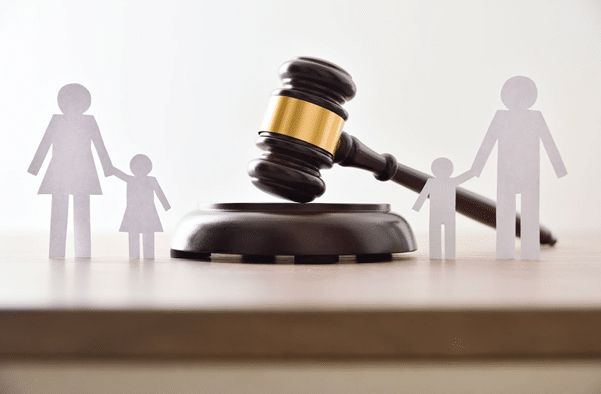* This bog post contains legal information and should not be taken as official legal advice. For legal advice, always consult with an attorney.*
Child custody disputes can extremely stressful and very disruptive not only to the lives of adults, but especially the lives of the children who inevitably end up in the middle. Child custody laws in Maryland can be a confusing and the process is often frustrating to navigate. With so much information and opinions floating around, it can be difficult to know where to even begin. This is where a Maryland divorce lawyer from Jezic & Moyse can help
It’s important to understand all pertinent terminology related to child custody proceedings, as well as the process itself. To address such concerns, we’ve compiled an extensive list of important terms and concepts related to child custody filings and proceedings.
Without further ado, let’s dive into it!
General Overview of Maryland Child Custody Laws
The Children’s “Best Interests” are at the core of Maryland divorce legislation
When the chasm between separated parents widens and consensus becomes elusive, the recourse often leads to initiating a custody petition within a Maryland Circuit Court.
The Court serves as the forum for resolving custody disputes and making determinations that align with the best interests of the child. The Court, in essence, takes on the role of a custodial referee, tasked with examining the unique circumstances and making a decision that best serves the child.
At the heart of Maryland’s custody framework lies the critical “best interests of the child” standard.
This foundational principle serves as a guiding light in custody and visitation decisions. It compels the court to scrutinize a plethora of factors that collectively influence a child’s holistic well-being. These factors will be discussed in detail in the following sections of this blog.
A Spectrum of Court-Ordered Custody Arrangements

Maryland’s legal landscape recognizes and accommodates an array of court-ordered custody arrangements, each tailored to the unique circumstances of the involved parties:
- Emergency Custody: If imminent danger is perceived, emergency custody can be requested, leading to a swift and temporary custody order.
- Legal Custody: Long term decision making for children, including major life decisions such as medical care and religious preferences.
- Physical Custody: Where the minor child resides, usually with a schedule outlining each parent’s access. While the child is with the parent, that parent will be able to make everyday decisions.
- Joint Custody: Categorized further into Joint Legal, Shared Physical, and Combination constructs, this custody arrangement emphasizes collaborative decision-making for the child’s well-being.
- Pendente Lite Custody: Also known as temporary custody (legalese can be a bit confusing), it serves as a provisional arrangement while awaiting formal adjudication.
- Sole Custody: This grants a parent sole legal, physical, or both forms of custody, depending on the situation.
Multifaceted Factors Influencing Custodial Decisions
In compliance with the “child’s best interest” standard, judicial deliberation involves a comprehensive examination of numerous factors that collectively influence the custody verdict including (but not limited to):
- Primary Caregiver: The parent is primarily responsible for the child’s daily care and upbringing.
- Fitness and Character: The mental and physical well-being of both parents (disability can also be considered if there is a valid concern).
- Existing Agreements: Any prior agreements between parents regarding custody.
- Child’s Preference: The consideration of a child’s preferences, taking into account their age and maturity.
- Child’s Characteristics: Evaluation of the child’s age, health, and gender, which can influence custody determinations.
- Material Opportunities: Assessment of the financial capabilities of each parent to provide for the child’s needs.
- Proximity and Residences: The geographic proximity of each parent’s residence to the child’s school, community, and extended family.
- Past Custodial Dynamics: Consideration of previous custody arrangements and any history of custody changes.
- Parental Disabilities: Assessment of any disabilities that could affect the child’s best interests.
- Religious Influence: Evaluation of religious beliefs and practices, especially if they impact the child’s well-being.
- Duration of Separation: The period of time since the parents’ separation, which can impact the child’s adjustment.
- Family Ties: The extent to which each parent fosters and supports extended family relationships for the child.
While this list is quite extensive, there can be other factors that may arise and influence the court’s decision when filing for child custody.
The Crucial Role of Jurisdiction
“Jurisdiction” denotes the framework governing the assignment of legal cases to specific courts. It operates as an intangible boundary, partitioning legal cases into discrete segments. The correct jurisdiction to file a custody case in is the State in which the minor child has resided for the prior six months.
In the context of Maryland, custody matters are heard in the Circuit Courts. Within Maryland, the parents can file in the county in which they live or in the county in which the minor child resides. It is important to consult with an attorney to determine when deciding the appropriate venue.
Child Custody, Visitation, and Financial Disputes
While we have covered a lot of important information so far, there are a few more things you should take into account when filing for child custody in Maryland, particularly when conflicting parties have a disagreement.
Enforcing and Modifying Custodial Orders
In situations where one parent violates a custodial order, parents need to remember that Custodial Orders are always modifiable. As such, the affected parent can file for a modification. That parent will need to prove that a material change in circumstances has occurred since the issuance of the prior order.
Modifying existing custody orders is a complex process requiring substantial changes in circumstances. The court’s primary concern remains the child’s best interests, ensuring stability and well-being.
Mediation (Court-Ordered or Voluntary)
Mediation can be Court-Ordered or parties can voluntarily enroll in a private mediation session. In mediation, parties are able to share their sides of the situation with a neutral mediator who does not represent either of them. Mediation can be a constructive pathway to bridge gaps between divergent parental perspectives. A neutral mediator facilitates constructive dialogue, with a focus on achieving agreements that uphold the child’s best interests.
In many cases, courts will encourage or mandate mediation, recognizing its potential to expedite resolutions while minimizing adversarial confrontations.
Tax Implications and Further Considerations
Traditionally, the custodial parent claims the child’s tax exemption. However, parents can opt for alternating exemptions by mutual agreement. It is important to consult with a tax specialist to ensure that you understand all potential implications of a Custody Order.
The Process of Filing for Child Custody in Maryland

Now that you’re aware of some of the things to consider before filing for child custody in Maryland, let’s take a look at the process itself.
To begin the process of seeking child custody in Maryland, the petitioner is required to complete a Complaint for Custody (CC-DR-004) and submit it to the appropriate Circuit Court, either where the child resides or where either parent resides. It is important to maintain copies of all court filings.
Regarding fees, the individual filing the initial Complaint is obligated to pay a court filing fee of around $165, as stipulated by the fee schedule. In cases of financial hardship, the petitioner may request fee waiver by submitting duly completed fee waiver forms alongside the Complaint.
Upon receipt of the Summons, the party who filed the Complaint must serve (notify) the opposing party by serving the Summons along with a copy of the Complaint. Without service, the Court cannot proceed on the Complaint. Importantly, the petitioner is not to carry out this distribution personally; a designated individual must undertake this task on their behalf.
Upon receipt of a Complaint, the recipient is to use form CC-DR-050 to file an Answer. This involves admitting or denying the statements outlined in the Complaint. Optionally, a Counter-Complaint for Custody (CC-DR-095) may be filed alongside the Answer if the requested custody terms significantly differ from those proposed by the opposing party.
Failure to file an Answer within the specified deadline could result in the petitioner seeking an Order of Default. The corresponding form, Request for Order of Default (CC-DR-054), can be used for this purpose. Subsequent to establishing proper service of process, the court may issue an Order of Default, permitting the custody case to proceed without the participation of the defaulting party.
Finally, after the filing of documents, the initial court proceeding often entails a scheduling conference presided over by a judge or magistrate. This conference serves as a platform for all parties involved to set dates for filing additional forms, discuss potential settlement-oriented programs, and set dates for future hearings. Subsequent court events may include mediation, Pendente Lite Hearing, Settlement Conference, Pre-trial conference, and more.
Consult a Maryland Child Custody Attorney Today
Caught in the midst of your own custody battle? As you have just seen, there are certainly a lot of factors to consider both before and after filing for child custody in Maryland.
That’s why our team at Jezic & Moyse is here to help. At Jezic & Moyse we understand that no price can be placed on the value of your loved ones and promise to be fighting and advocating at your side while navigating this difficult legal process. With decades of experience, we guarantee your delicate situation will be handled with the passion and professionalism you would expect from one of Maryland’s top legal firms.
Contact us today for in-depth legal consultation of your domestic matter at hand.

